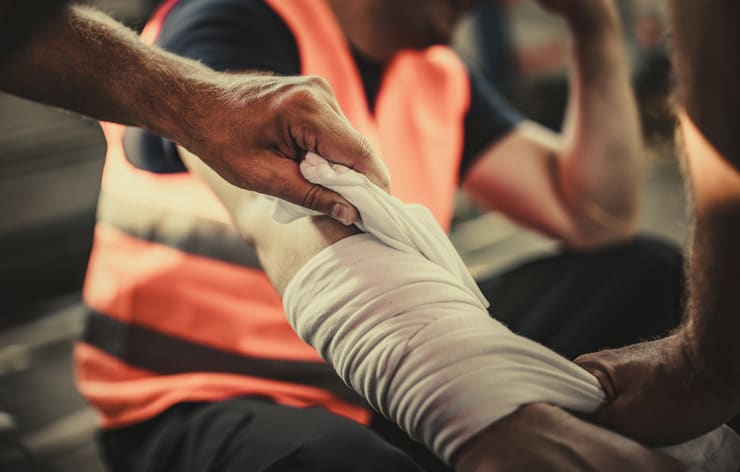ARE BUSINESSES REQUIRED TO COVER WORKERS’ COMP FOR EMPLOYEES?
When you’re hurt at work, you immediately begin to wonder about whether you can get workers’ compensation for your injuries. You may have heard that there’s a workers’ compensation system that pays you if you’re hurt at work.
The State of Colorado has a workers’ compensation system. You may also know that there are complex rules for when a business is required to cover workers’ compensation for their employees. Here’s what you need to know from our Denver workers’ compensation lawyers.
Bachus & Schanker Wins – Over $1 Billion Recovered
- When is a Business Required to Cover Workers' Compensation for Their Employees?
- What Does a Colorado Business Have to Cover in Workers' Compensation?
- Colorado Workers' Compensation Payments
- Can I Go to My Own Doctor for Workers' Compensation?
- Colorado Workers' Compensation Insurance Requirements
- Do I Need Workers' Comp Insurance If I Am the Only Employee?
- Do Employees Get Paid While on Workers' Comp?
- Do Members of an LLC Need Workers' Comp?
- Does Workers' Comp Pay for Pain and Suffering?
- Do I Need Workers' Comp for One Employee in Colorado?
- Business Requirements for Workers' Compensation Coverage in Colorado
- Contact Our Denver Workers' Compensation Attorneys
- Visit Our Office Locations Across Colorado & Beyond
- Related Workers Compensation Resources
- You Deserve Fair Compensation
When is a Business Required to Cover Workers’ Compensation for Their Employees?
A business is required to cover workers’ compensation for their employees anytime an employee has a work-related injury or illness. The business must provide medical care that is necessary and reasonable for the injury or illness.
In addition, the business is required to pay the employee for lost wages if the injured employee can’t work. A business is required to cover workers’ compensation whenever an employee reports a work-related illness or injury.
What Does a Colorado Business Have to Cover in Workers’ Compensation?
A Colorado business has to cover medical bills and lost wages in workers’ compensation. They must pay for medical bills related to care for the employee’s injuries. They must also pay a certain amount for lost wages. If the employee has a permanent disability, the employer must provide compensation based on a schedule for each type of injury, or they must continue to pay wages.
Colorado Workers’ Compensation Payments
Here’s when a business is required to cover workers’ compensation for their employees:
- Because of the injury, the employee misses three shifts or three days of work.
- The injured employee must report the injury or accident within four days. If you report the injury late, you can still recover for your injuries, but there’s a penalty.
- The employer must pay ⅔ of the employee’s average weekly wages.
- Wage payments are capped at 91 percent of the average weekly wage in the State of Colorado
- Payments continue until the employee returns to full work or until the employee has received the maximum medical benefit from treatment.
- In cases of permanent disability, whether full or partial, there’s additional compensation to the employee for the loss.
- Missing a medical appointment can result in termination of benefits.
Can I Go to My Own Doctor for Workers’ Compensation?
An employer may send the employee to the medical care provider of the employer’s choice. If the employee wants to go to their own doctor, the employer doesn’t have to foot the bill. The injured employee can only pick their own doctor if the employer doesn’t have a specific doctor that they want the employee to go to.
Colorado Workers’ Compensation Insurance Requirements
Colorado law requires an employer to have workers’ compensation insurance even if they have only one employee. Whether the employer is public or private, they must provide workers’ compensation for their employees. When a person performs services in exchange for pay, the law presumes that they’re an employee.
Do I Need Workers’ Comp Insurance If I Am the Only Employee?
If you are the only employee, you do not need workers’ comp insurance. However, you’re only exempt from workers’ comp if you’re self-employed. If you’re the sole employee of someone else’s business, they still need to have an insurance policy for you. Also, some business contracts require self-employed parties to carry workers’ compensation insurance.
Do Employees Get Paid While on Workers’ Comp?
While on workers’ comp, employees get paid a percentage of their wages. They don’t get the full amount that they would be making if they were at work. However, they get some compensation up to a maximum amount. The maximum amount is based on the employee’s income and average wages in the state.

Do Members of an LLC Need Workers’ Comp?
No, members of an LLC do not need workers’ comp as long as they don’t have employees. If you have employees, you have to have workers’ comp that covers your employees. However, you can exclude yourself and the other members from coverage.
Does Workers’ Comp Pay for Pain and Suffering?
No, workers’ comp does not pay for pain and suffering. Workers’ comp pays for medical expenses and lost wages. It does not award the victim any compensation for pain and suffering. However, there may be other avenues available to seek compensation for pain and suffering after a work-related injury.
Do I Need Workers’ Comp for One Employee in Colorado?
Yes, you need workers’ comp for one employee in Colorado. State law requires any business that employs even one worker to carry workers’ compensation. Although premiums vary based on the number of employees, even one employee is enough to require an employer to carry workers’ compensation insurance.
Business Requirements for Workers’ Compensation Coverage in Colorado
Workers’ compensation in Colorado is a two-way street. It’s up to the business to have the insurance coverage that state law requires. But it’s up to the employee to report the claim. Similarly, it’s up to the business to cover medical care and pay lost wages. But it’s up to the employee to attend medical appointments. A business must cover workers’ compensation in Colorado when the law requires them to pay benefits, and when an employee makes a valid claim.
Contact Our Denver Workers’ Compensation Attorneys
Do you need help with a workers’ compensation claim? Are you wondering if your employer owes you payments for a work-related injury or illness? We can help.
Our workers’ compensation attorneys in Denver are determined, aggressive legal professionals. It’s our passion to fight for good people who need help exercising their rights under Colorado law. Each work injury case is complex. Whether you need help getting the right medical care and getting it paid for, recovering fairly for lost work or seeking compensation through a third-party negligence claim, our attorneys can determine what you need to do and execute a plan that advocates for your rights and best interests.
Don’t become a victim twice. Our Colorado attorneys are standing by to answer your questions and begin learning about your case. Contact us today for a free and confidential consultation. We are conveniently located at 5 Colorado locations near you in Denver, Fort Collins, Colorado Springs, Aurora, and Englewood. Our attorneys are ready to serve you and fight for the compensation you deserve.
Visit Our Office Locations Across Colorado & Beyond
Serving Clients Nationwide
Related Workers Compensation Resources
You Deserve Fair Compensation
Don’t let the insurance companies intimidate you into accepting less than you deserve. We’re ready to fight for you.

Written and Legally Reviewed By: Kyle Bachus
4.6 ★★★★★ 1,461 Google Reviews
Kyle is a member of the Colorado Bar associations and has served on the Board of Directors of the Colorado Trial Lawyers Association for more than twenty years in total. Over the years, Kyle has achieved justice for many clients. He has served on numerous committees and repeatedly won recognition from his peers at both the state and national level. He is proud of the role he has played in the passage of state and national legislation to protect consumers and is a frequent speaker and guest lecturer.













